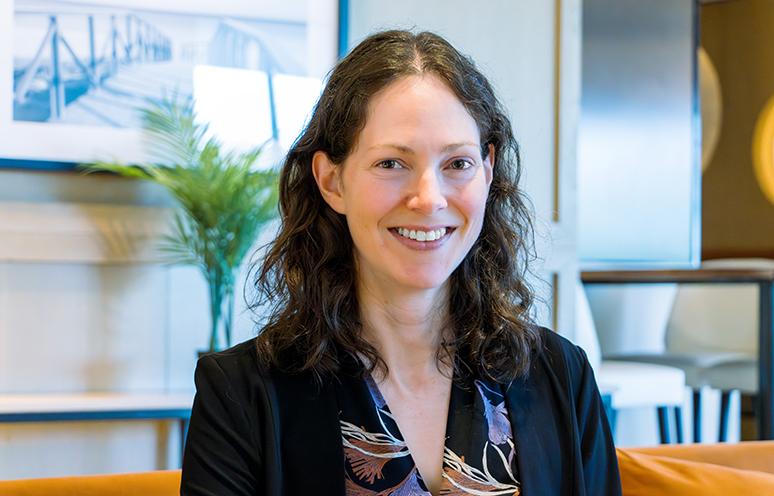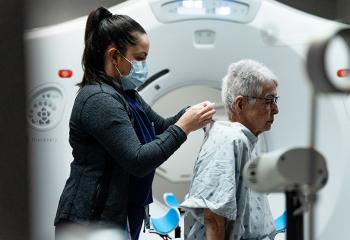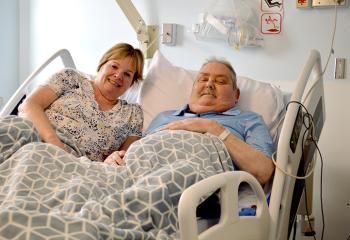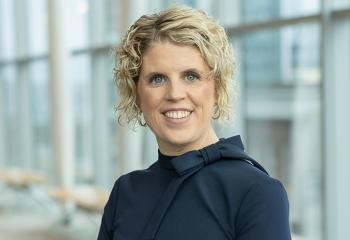
Dr. Amy Trottier leads a translational research program that has allowed her to establish a hereditary hematologic malignancy risk clinic at the QEII. Her research investigates underlying genetic causes of blood cancers as well as a less invasive method for genetic testing for blood cancers. QEII FOUNDATION
QEII researcher establishes hereditary blood cancer risk clinic with support from QEII Foundation
There remains a lot to learn about blood cancers and their genetic risks, but vital funding from the QEII Foundation is helping pave the way for groundbreaking research in the pursuit of answers and improved patient care.
Dr. Amy Trottier, an assistant professor with the QEII’s Health Sciences Centre’s Division of Hematology and Hematologic Oncology, leads a translational research program that has allowed her to establish a hereditary hematologic malignancy risk clinic at the QEII. The research investigates underlying genetic causes of blood cancers as well as a less invasive method for genetic testing for blood cancers.
“The program revolves around the funding from the QEII Foundation through the Wickwire Fund to help establish both the clinic and the clinical genetic testing that we now have, which is the first in Canada for both,’’ Dr. Trottier explains.
The research funding has allowed Dr. Trottier to hold half-day clinics each week where she sees patients and family members referred to her with a suspected predisposition to blood cancer because of a significant personal and/or family history of blood cancer.
“It’s a unique opportunity for Nova Scotians and their families to be seen in the risk clinic for those who have any degree of suspicion and get offered this testing. Depending on the results, (it) can have a dramatic impact on their management and we can better personalize their care,’’ she shares. “There’s been a big leap forward from the days prior to establishing the clinic when there was no genetic testing for blood cancers anywhere in Canada.”
Patients can access the clinic if they have already been diagnosed with a blood cancer or have received a new diagnosis. Dr. Trottier says she also receives patient referrals from other hematologists, family physicians and Maritime Medical Genetics.
Patients undergo a comprehensive assessment at the clinic and, depending on the level of suspicion, have the opportunity to take part in clinical genetic testing as well as research studies, which Dr. Trottier says varies based on the type of cancer.
The current “gold standard” genetic test for blood cancer patients involves a skin punch biopsy, which can only be done and processed in Halifax. However, she’s investigating the use of nail clippings as a much less invasive and convenient means of obtaining hereditary DNA, which can be done anywhere and at no risk to patients. She currently has over 100 samples.
She says this pioneering work simply would not have been possible without start-up funding from the collaborating partners.
“Funding has allowed everything to happen, she points out. “Blood cancers, and cancers in general, are still a field of learning so the research funding from the QEII Foundation is vital to offer patients further testing and discovering what we don’t yet know.’’
Eve Wickwire established the Wickwire Fund in 1992 in honour of her late husband Ted, who passed away in 1991 after a courageous 10-year battle with Hodgkin’s Lymphoma. Although he received the best care at the QEII for the first five years of his illness, Eve said there simply came a time when there were no more treatment options available to him in Halifax.
Unwilling to accept that she might lose Ted, Eve found a specialist in San Francisco, Dr. Saul Rosenberg, who was the world leader in the treatment of Hodgkin’s disease. Eve and Ted, with the assistance of their friend Dr. Don Hill, managed to get an appointment with one of Dr. Rosenberg‘s assistants.
Once they arrived in San Francisco, Eve was determined for her husband to see the doctor himself. She found his address in the telephone directory and wrote him a letter asking him to see Ted in person, which she nervously hand-delivered to his home. Much to Eve’s surprise, he showed up at the hospital the next day to meet Ted.
“He looked after him for five years and gave him five extra years of life,’’ she says with great gratitude. “We travelled there about every six months. Sometimes Ted would be sick and other times it was just for a checkup.”
Shortly after Ted’s death, Eve says she wanted to help other people, particularly those with blood cancers. She developed a list of 100 potential donors and wrote personal letters to each one of them. The response was incredibly generous, and even after all these years, the Wickwire Fund continues to provide grants for research and education into blood cancers like that of Dr. Trottier.
“I feel very incredibly lucky,” shares Eve. “Ted was the love of my life and to do something like this for him was just a complete pleasure. It’s all in his memory and I think of him every day. I feel very thankful for any other Hodgkins patients who have been helped by our research. I’m grateful for their extended life, especially if I’ve had a very, very small part in it.”


